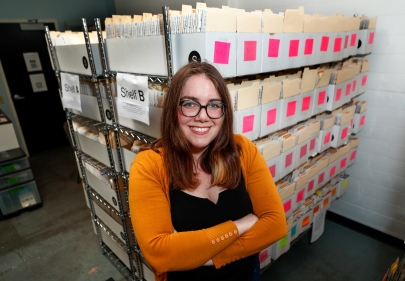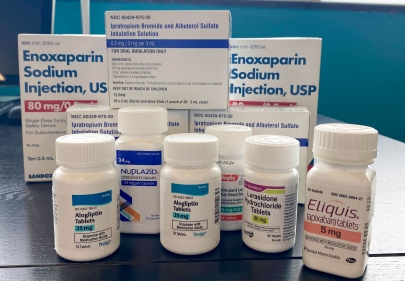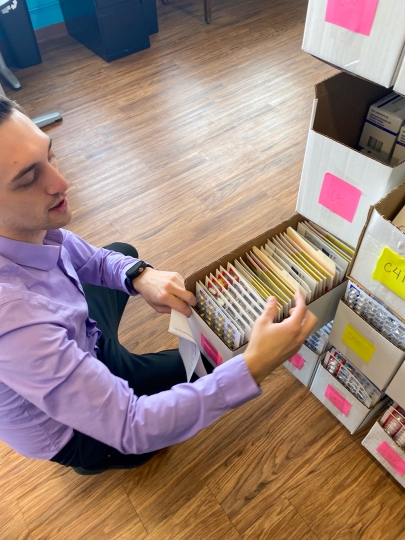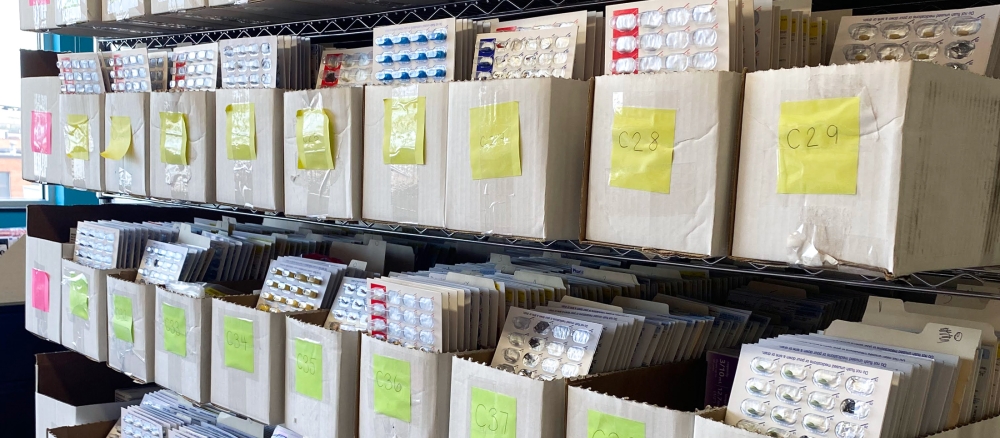Leftover medications might seem like an unlikely source of waste, but unused drugs going into landfills or the sewer can cause significant harm to wildlife and the environment. So where can these perfectly good pills go? Enter MPCA grant recipient RoundtableRx.
RoundtableRx is a nonprofit operating the Minnesota Medication Repository Program, which reduces pharmaceutical waste by collecting excess medication for redistribution. The MPCA recently provided a $52,910 grant for education and outreach to help solve the pharmaceutical waste issue in Minnesota.
How it started

In 2017, a group of University of Minnesota College of Pharmacy students, led by Rowan Mahon — now the interim executive director of RoundtableRx — launched the initiative. The students came up with a clever way to reroute the unused medications to people across the state who may struggle to afford prescriptions and are often left with the choice of paying for their prescription or buying food and clothing.
“The testimonials we’ve heard from people who use our service are very moving,” said Rowan Mahon, interim executive director of RoundtableRx. “One woman said she was able to buy clothes for her kid with the money she would’ve had to spend on her medication.”
The students discovered there was an enormous need right here in Minnesota for people to get connected with medications they otherwise wouldn’t be able to afford.
Care Providers of Minnesota estimate $16 million in unused and safe medication is disposed of by more than 300 long-term care facilities in Minnesota. These medications doomed for disposal could provide an estimated 6.3% of uninsured Minnesotans with some of the medications that they need.
RoundtableRx became an official nonprofit in 2019. Since then, it's been working to match these facilities with health care providers to manage medications properly while routing waste away from the landfill.
The problem with waste

The MPCA has been monitoring pharmaceuticals in the environment, also known as “emerging contaminants,” since 2008. Traces of pharmaceuticals have been found throughout the environment: in surface water, stormwater, rain, snow, and even in the air.
“The main problem is when pharmaceuticals enter the environment and affect fish and wildlife populations,” said Mark Ferrey, a MPCA research scientist.
Though it’s difficult to know exactly how pharmaceuticals affect the fish and wildlife populations, some scientists believe that we should be concerned about these medications entering the environment.
Even as recent as a decade ago, the general advice on medication disposal was to flush them down the toilet to prevent children from accidentally ingesting dangerous medications or having those pills end up in other uncontrolled situations. But now, Ferrey says that science understands how flushing pills exposes pharmaceuticals directly to the environment since most wastewater treatment plants cannot remove them from wastewater.
There are two safe methods for medication disposal. One involves bringing them to medication drop-off locations found all across Minnesota at pharmacies, clinics, and police departments. The unused or expired medications brought to these locations will be managed and disposed of properly, often by incineration at 2,200 degrees Fahrenheit, which is the temperature required so the medications' contaminants don’t enter the air.
These takeback programs have been very successful in collecting pharmaceutical waste. From 2007 through 2021, 730,000 pounds of medications (not counting packaging) were collected from Minnesota households.
The other way to safely dispose of medication involves programs like RoundtableRx, which accepts unused, unexpired medication that will then go to people in need.
“RoundtableRx is able to accomplish these two things because their goal is to prevent usable pills from going to waste and keep them out of the landfill,” said Ferrey.
How it works

RoundtableRx accepts donations of unused and unexpired medications as well as some medical supplies, often from long-term healthcare facilities like nursing homes and assisted living facilities. People can donate their unused medications, too, and Roundtable Rx accepts unused medications from any state.
RoundtableRx will confirm whether the donations meet safety and quality standards. Once they are approved, individual donations are mailed to its Minneapolis office; donations from pharmacies and healthcare facilities are managed by its partner SIRUM. The donated medications are then inspected by a licensed pharmacist to ensure that they are safe. Local repositories order the medications at no cost and dispense them to uninsured or underinsured patients.
Pharmacists and medical practitioners can match their patients who may struggle to afford medication with RoundtableRx’s services.
“For example, say there is a pharmacy in Duluth and a pharmacist sees a patient who is about to walk out without their heart medication. They can match the patient with leftover medication from the repository,” Mahon explains.
To qualify for these free medications, Minnesota residents must be uninsured or underinsured. Most patients who receive assistance from RoundtableRx are over 50, and most of these patients live in Greater Minnesota.
If a patient communicates to their doctor that they can’t afford a prescription, then those physicians can connect them with RoundtableRx.
For many patients, RoundtableRx’s services are a huge relief from financial pressure. Some patients reported that before being recommended to RoundtableRx, they’d ration out their medications to save money, putting themselves at risk of health complications for not getting enough of the medication they needed.
Refraining from taking medications as instructed can be dangerous, leading to health care expenses and emergency room visits that otherwise could be avoided.
One patient told RoundtableRx, "Thanks to [my care team & RoundtableRx], I'm able to have meds I would have gone without. Thank you from a congestive heart patient who would die without these pills."
With this grant from the MPCA, RoundtableRx has been able to cover critical staffing and shipping costs to get medications into the needed hands. The nonprofit has also invested in educational opportunities like conferences for its pharmacists, which also allow the nonprofit to share their work through word of mouth.
“We rely on grants like this to do our work,” said Mahon.
As the nonprofit continues its work, there are ways that you can help their mission by donating your own meds or volunteering. Learn more about how you can get involved: Careers | RoundtableRx

